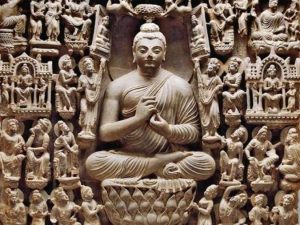This is the third article in our series “Buddhist Voices from the Land of Rivers.” Here, John Cannon describes his visit to Moanoghar, an educational institution for indigenous children in the Chittagong Hill Tracts.
My one-day visit on 28 May to Moanoghar in Rangapani, a sub-district of Rangamati town in the Chittagong Hill Tracts (CHT), has left a great impression. Moanoghar is a vivid example of how an institution has coped with the needs of children from impoverished indigenous families caught up in turmoil, tragedy, and the fight to sustain life, valiantly providing them with shelter, protection, love, and hope for a better future.
Moanoghar clearly states on its website: a vision to help the “disadvantaged and marginalised communities of the Chittagong Hill Tracts have access to the basic service necessary to give them a secure future, and in which the various cultural traditions of its people can be shared and cherished”; and a mission to “provide formal education, vocational training, health services, and support for the overall socio-economic development of its students in the area and the wider community . . . and preserve indigenous culture and to act as a symbol of communal harmony to the wider community.”
These lofty aims, arising from compassion and the desire to relieve suffering, have been implemented with dedication and devotion by the staff. Many are former Moanoghar students, returning to express their gratitude for the opportunities they were given and to ensure the institution’s spirit—the determination for destitute and orphaned children to receive shelter and education—never flags.
A small group of socially engaged Buddhist monks and laypersons established Moanoghar in 1974 as a response to two catastrophic events that adversely affected the indigenous peoples, especially the children, of the CHT—construction of the hydroelectric dam at Kaptai and the Liberation War in which Bangladesh achieved independence from Pakistan.
Kaptai Dam was completed in 1962 at great human cost. One third of total arable land was submerged under water, displacing more than one hundred thousand indigenous people—mostly Chakmas. Uprooted families received no compensation, leaving them severely distressed. The head monk of Boakhali Dashabal Raj Vihar in Dighinala opened a home—Parbatya Chattal Boudha Anath Ashram—in 1963 to provide shelter, food, and education for the children.
During the nine-month Liberation War in 1971, many indigenous people either became refugees—there is still a sizable Chakma refugee population in India—or were internally displaced across the whole CHT. In response, Venerable Bimal Tissa Mahathero, Venerable Prajnananda Mahathero, Venerable Shraddhalankar Mahathereo, and laypersons from the ashram founded Moanoghar in 1974.
The situation further deteriorated in the mid-’70s when a guerilla war against the government for autonomy of the CHT broke out. This was a very turbulent period in which indigenous villagers suffered greatly, with massacres on both sides. Moanoghar was the only safe haven for hundreds of traumatized children suffering from physical injury and loss of family members.
Moanoghar still plays this important role today for many children of indigenous families in the Hill Tracts. The remoteness and vastness of the region became starkly clear to me when a student revealed that it takes him three days to go back to his home village—by CNG and boat, and then on foot!
Moanoghar now covers over 100 acres of land donated by supporters over the years. There are administration buildings, classrooms for primary- and secondary-school students, and separate dormitories for boys and girls. Each dormitory has from 25 to over 50 students, and is assigned a house tutor to take care of the children and to help them with their studies. The boys’ dormitories are simple but comfortable, with their own drawings hung on the wall outside for all to see.
Other facilities include a computer center, a mini hospital (for minor cases), a music school, a display center, and a bakery. As well as baking, the children working in the bakery are responsible for packaging and selling the goods in the adjacent shop, which is open to the public. They even deliver goods to be sold at small shops outside Moanoghar. I observed the children happily packaging recently baked items. Boys usually work in the bakery’s kitchen, while girls look after the shop.
The compassion I found at Moanoghar extends beyond the children themselves, to include family members. Some of the children’s mothers have been offered employment to help provide greater financial ability to pay tuition fees and to keep the family together.
I encountered four such women, all widows with children studying at Moanoghar. Two work as house tutors for the girl students, one works in the display center selling traditional clothing and other souvenirs, and the fourth one works as a cook. The cook’s husband was killed in 1988 during a village massacre.
I still remember the vivacious widow from the display center who, later that evening, walked back with me and Venerable Buddhadatta in the rain to where I was staying, ever smiling and hopeful. In addition to working in the display center, she also does a brisk photocopying service for students and staff, as well as cooking meals for guests. Her husband died of cholera, malaria, and jaundice. She has two sons, one studying at Moanoghar and the other a CNG driver. In fact, it was her son who drove me around in his CNG during my stay in Rangamati.
That evening I was invited for dinner at Moanoghar, where I met an administrator, a former student, who works in the office of the executive director. He told me he has a wife and five-year-old daughter but they live in a different district, far from Rangamati. He returns home twice a month and on holidays. I was touched by his devotion to the school and the steadfast support he receives from his family during the extended periods of separation.
During the afternoon, I had met a young student. She was quiet as she stood close to Venerable Buddhadatta—joint secretary of Moanoghar—a faint smile eager to break through while he told me her story. Her parents were killed in a village massacre; she and her brother were attacked, and his leg was severely injured. After being taken to Moanoghar, she has been studying singing and dancing, and is becoming less traumatized. Truly, this is a sign of lightness after so much darkness!
Recently, I received the Moanoghar News Bulletin for June 2014 with profiles of three students awarded scholarships: Sumi Tanchangya—from a jum (shifting cultivation) farming family and sent to Moanoghar because there is no school in her village, who hopes to be a nurse; Milipru Marma—from Bandarban, who wants to be a women’s rights activist; and Eli Chakma—from Khagrachari, who wants to be a teacher; her father died when she was two years old, and her mother toils on a small plot of land she inherited.
I was so moved by what I witnessed and experienced at Moanoghar that, since returning to Hong Kong, I have been sponsoring an 11-year-old Chakma student. In supporting his studies at Moanoghar, not only does one individual benefit but also his family and, by extension, the village or the wider community he lives in. I am truly humbled.
For further information, see:
In Conversation with Venerable Buddhadatta
Villagers Observing “Uposatha” in Rangamati
Taking the Plunge
Kaptai Dam
Liberation War














